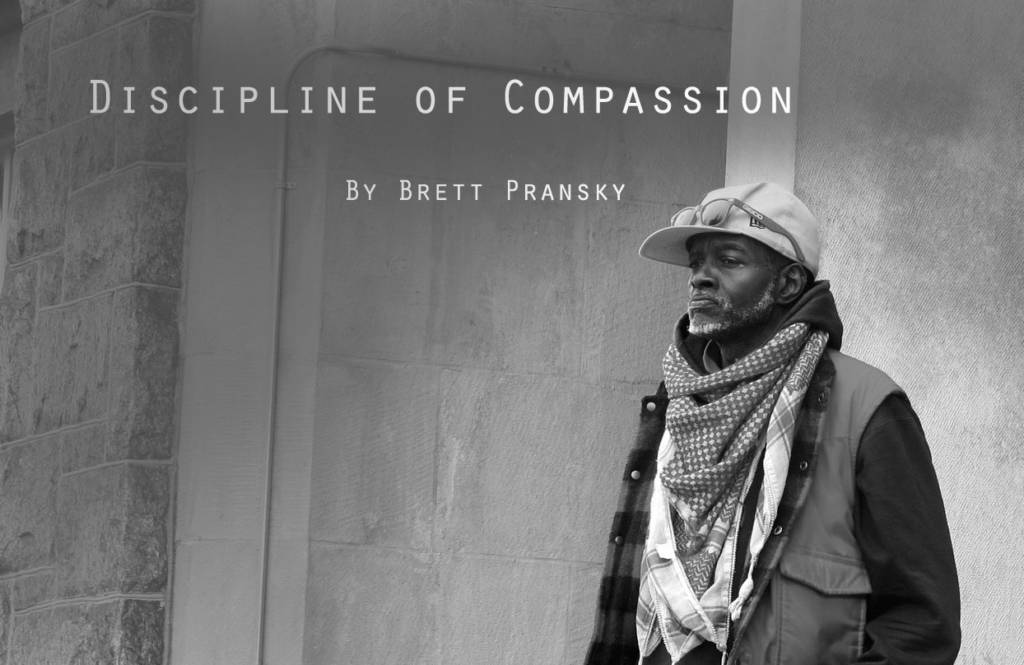By Brett Pransky
It happened in a parking lot. It’s a story you’ve heard before.
As I walked out of the bookstore and into the familiar chill of January in Ohio, I saw him watching me. I wasn’t frightened; the neighborhood might not be the greatest, but I had lived there for thirteen years — long enough to know the difference between danger and desperation. He was going to ask me for money, not steal it.
There’s no need to describe him. By now, my readers have already attached their favorite stereotypes, and I’m not going to deconstruct those in the short time we have together. Just know that he was polite, humble and most importantly, human.
He had a story, that may or may not have been true, about being stranded and needing help with bus fare. His delivery looked something like a prayer — fingers interlocked and chest high, hands gently rocking forward and back every few syllables. I wasn’t really listening. I didn’t really care about the details. He was asking for help; the rest is just noise.
And noise is the problem. As he approached, I had to tune out the things people in my life have said about similar encounters, opinions containing cringe-worthy phrases like “those people” and an endless stream of tiresome bootstraps metaphors. In order to be human, it seems, we must first confront the glaring lack of humanity all around us.
That’s the discipline. You see, compassion is no longer simply a human trait, at least not in America. Here, we have to want it; we have to work hard to set aside the messages; the consumerism, the demagoguery, the sheer tonnage of influence exerted by those who couldn’t possibly care less about people stranded in the cold. Helping each other is no longer our natural reaction to pain and suffering; instead we blame, make excuses, dehumanize … anything to absolve us of our simplest and most important responsibility, to simply behave as decent people would.
I can’t remember how much money I had in my pocket, only that I had to push aside my new iPhone to collect it. Some change, a bit of folding money. I gave it to him before he could finish his pitch. Like I said, I wasn’t really listening anyway.
He looked down at his hand and his face changed in a way that told me the money was more than he expected. He tried to give me some of it back, said it was more than he needed. I simply smiled and refused, and the fact I can’t remember the sum today confirms that it was not too much. Not at all.
In my life, I’ve had dozens of these encounters, none of which should be special, or worthy of any storytelling after the fact. In a country where poverty is growing at a frightening pace, where good jobs are scarce, where the gap between rich and poor is wider than it has ever been before, where few have all and many have barely enough, it seems only natural that our collective compassion would grow in proportion to the need, that we would begin to see the world how it is. It’s tough out there. According to the numbers, it’s much tougher than any of us remember.
He said thank you, blessed me and turned away. I thanked him and did the same.
I pressed the unlock button on the key to my Honda, climbed in, started the engine, turned on the heat and never looked back. I looked forward, though. I pulled out of the lot and felt equal parts of pride and shame, the simultaneous feeling that I had done something right and also something terribly incomplete. I often wonder if it is this feeling, not the excuses, that makes us ignore reality, that perhaps it is not our greed that makes us do nothing, but our deeper understanding of just how large the task really is, and how small we are in its shadow.
On the next corner stood a man with a cardboard sign. It said something about him being a veteran, about wanting to work for food and shelter. I wasn’t really reading. I didn’t really care about the details. The only thing I could think about was the fact that I no longer had any money in my pocket.
Brett Pransky is a professor, a writer and a dad, not necessarily in that order. You can email him at [email protected].
This piece originally ran in Street Speech, a Columbus, Ohio newspaper.




